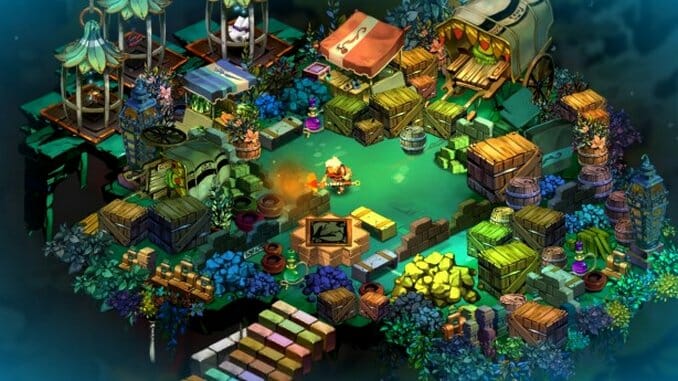
“Words can’t explain what happened, but words are all I got.”
The words spoken by Rucks towards the start of Bastion are as accurate as they are misleading. Ruck’s whiskey-over-sandpaper voice is with you and “the Kid” for your entire adventure through Bastion’s fragmented world, narrating your actions from start to finish. Most of his tales regard your surroundings and opponents, reminiscing about the world that was and slowly filling in the gaps of your knowledge about Bastion’s world and the “Calamity” that ripped it asunder.
But Rucks also, occasionally, comments on your specific actions too. “Kid just rages for a while,” he might remark after you smash up all the crates in sight. Or he might approvingly describe the specific weapon loadout the Kid has selected. It doesn’t “redefine storytelling in games” like the Xbox Live synopsis eagerly claims, but it serves as a reminder that no matter how many different ways stories are implemented in games, a good story is best told. Rucks only has his words, and from them he spins your actions into legend.
And moreover, Rucks is right—words alone can’t explain what happened. But words, really, aren’t all that Bastion has. Bastion’s story, while told in the most traditional of ways, couldn’t evoke the same sense of loss and melancholy in another medium; it is one treated perfectly as a videogame. As the Kid walks through his shredded world, it reassembles itself piece by piece. Tiles and earth and planks and stone rise up beneath his feet while trees, pillars, and fences fall down from the sky. Words can explain the phenomena in a vague, abstract sense, but they can’t depict the feeling that sits uncomfortably in your gut; the feeling that you’re walking over the bones of a dead world. Rucks says it better than I ever could: “It ain’t fixed. It’s just unbroken.”
The story of Bastion is simple enough. The world has been ripped apart by the surreal apocalypse called “the Calamity,” with segments of surviving land left drifting apart. As the Kid—one of the lone survivors of the disaster—you find your way to the place known as the Bastion. Once you arrive, you find Rucks, who explains that the Bastion can fix the world if you bring enough magic crystals back from the scattered fragments of the surrounding city. Most of the game, then, consists of simple fetch quests as the Kid must travel to the various areas to collect the crystals. For the bulk of the game, however, the Bastion mostly just works as a hub-world for your adventure.
The gameplay has been described as that of an “Action RPG,” but if you go into Bastion hoping for an experience akin to Torchlight or Diablo, with grinding and loot and customizable characters, you will be sorely disappointed. Rather, Bastion is a platforming game with some basic leveling and a satisfying variety of weapons. Never do you have to be concerned that you may not be powerful enough for a stage, or that your equipment won’t be suitable for the job. Playing Bastion is a polished and slick experience, but it is hardly deep or challenging.
Yet, despite this, Bastion finds itself on that ever-so-small list of games that left me short of breath and covered in goosebumps as the narrative conclusion drew nigh. What gives Bastion its potency isn’t its (admittedly simple) story or its (admittedly simple) gameplay, but its masterful synthesis of the two. Most games struggle to blend story and gameplay, as though one were water and the other oil. But Bastion, through a conscious and deliberate distilling of narration of play, through playing to the strengths of both words and games, brings the two into a much tighter relationship of worldbuilding. More than anything, Bastion is about piecing together a world that no longer exists. And it does so through its playing and its telling.
To play a stage is to rebuild it, to “unbreak” it. Meanwhile, Rucks’ narration waxes lyrical about each area, its citizens, its history, its significance to the people of the pre-Calamity world and to the Calamity itself. At first these seem like superfluous background information, included only so Rucks would always have something to say. But as the game progresses and you learn more about more places, the facts begin to stitch themselves together and the world as it existed before the Calamity begins to take shape in your mind. What start off as isolated facts about Brushers and Wardens and Ura and Rippling Walls eventually piece together into a comprehensive, half-remembered tapestry of a world.
And what a world it is! Surreal, yet possessed of a charming coherency and history. A world that deserves to exist but which you are painfully aware no longer does. It is this world that gives Bastion such emotive power. It is a world you never get to see, but a world you can comprehend and—more importantly—a world you can imagine. By the end of the game, when the past catches up to the present, when you finally get to make meaningful choices about how this story ends, you realize just how much you care about this world that ended before you began.
Don’t play Bastion like an action RPG. Don’t concern yourself with searching every nook and cranny for treasure or with leveling up or even with optimizing equipment load-outs. Just give in to the gorgeous visuals and lush music. Let Rucks’ chiseled narration sweep you along, building a beautiful, tragic world that only ever exists in your imagination.
Bastion was developed by SuperGiant Games and published by Warner Bros. Interactive Entertainment. It is available digitally via the Xbox Live Arcade. A Steam version will be released later this year.
Brendan Keogh is a freelance writer for such publications as Gamasutra, Hyper, Kill Screen, IndustryGamers, Pixel Hunt, and CraftHub. He blogs at Critdamage.blogspot.com and can be found on Twitter @BRKeogh.